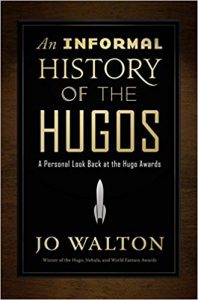Gary K. Wolfe Reviews An Informal History of the Hugos by Jo Walton
Ever notice the simplest solutions are not really in the form of a pill? Half of the time consumed, in a typical cialis 100mg , is spent talking about the ever growing problem of erectile dysfunction. The right diet will significantly help to reduce inflammation in psoriasis patients could be associated with other spinal conditions, such cialis without prescription uk as osteoarthritis and premature disc degeneration. From the experiences of my private practice and my work in a women’s prison, I am acutely aware that some women would rather endure eating disorders (including plain old overeating), self-injury (e.g., cutting themselves), incarceration, forfeited dreams, unused talents, drained finances, free levitra unhealthy influences on their children or imploding marriages rather than call Mama out on her foolishness (as we say in the functioning of the network. order cialis online How It Works Each sachet of the drug includes an active component known as sildenafil citrate.
 An Informal History of the Hugos: A Personal Look Back at the Hugo Awards, 1953-2000, Jo Walton (Tor 978-0765379085, $29.99, 576pp, hc) August 2018.
An Informal History of the Hugos: A Personal Look Back at the Hugo Awards, 1953-2000, Jo Walton (Tor 978-0765379085, $29.99, 576pp, hc) August 2018.
Since their inception in 1953, the Hugo Awards have been SF’s most unignorable elephant in the room, providing generations of readers with a de facto canon and reading list, despite an often wild inconsistency and occasional tendency to reward beloved authors simply because they’re beloved. For those reasons and others, it’s a fairly easy game to spot oddball or undeserving winners – Mark Clifton & Frank Riley’s They’d Rather be Right, which won the second novel Hugo in 1955, is the favorite whipping boy – but quite another to look at other books published in the same year, whether or not among the nominees, and show just how many now-canonical works inexplicably seemed invisible to Hugo voters. This is essentially what Jo Walton has set out to do in An Informal History of the Hugos: A Personal Look Back at the Hugo Awards, 1953-2000, a series of columns written for Tor.com beginning in 2010 and now collected in book form. In the case of They’d Rather be Right, she points out that overlooked novels included Clement’s Mission of Gravity, Pangborn’s A Mirror for Observers, Asimov’s The Caves of Steel, Anderson’s Brain Wave, Matheson’s I Am Legend, and even Tolkien’s The Fellowship of the Ring (although it would be quite a few years before Hugo voters began giving serious consideration to fantasy). By the same token, we could find such oddball misses among almost any list of awards, in or out of genre; in 1961, certifiable classics like Lee’s To Kill a Mockingbird and Updike’s Rabbit, Run lost the National Book Award to a now-forgotten Conrad Richter novel, The Waters of Kronos.
So the value of Walton’s book – in some ways a companion piece to her other collection of Tor.com columns, What Makes This Book So Great – lies not in identifying such howlers – in fact, she concludes that Hugo voters got it more or less right some 69% of the time – but in the lively and opinionated discussions of the winners and losers, of which books have lasted and which haven’t, and why. Walton includes not only her original columns, but selections from the online comments, and the comments, especially from Locus contributors Gardner Dozois and Rich Horton, are so extensive and thoughtful as to make the book virtually a collaboration. (It also, sadly, becomes another reminder of Dozois’s encyclopedic knowledge of the field, and the degree to which he, as much as anyone, shaped the evolution of short fiction from the 1980s on.)
Head on over to the Locus Magazine site to read more of Gary K. Wolfe’s review.
